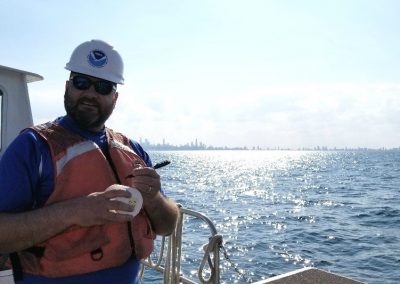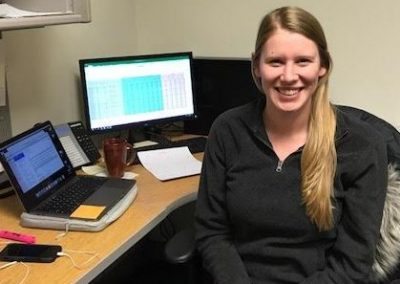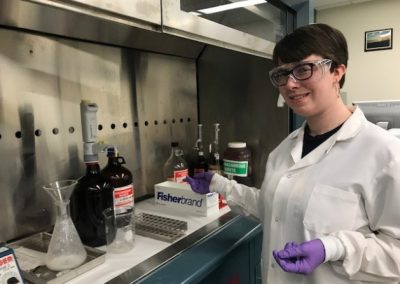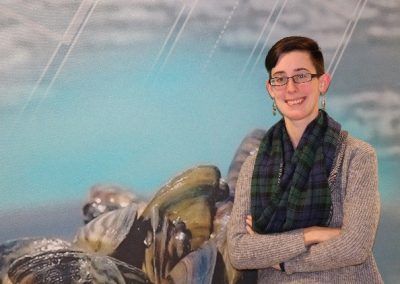Winter 2018 eNewsletter
Winter CIGLR Announcements
Glenn Carter is a Benthic Ecology Research Technician assisting in the laboratory and with field operations, with Drs. Ashley Elgin and Hank Vanderploeg (NOAA GLERL). He holds a Master’s degree in Aquatic Ecology from the University of Michigan School of Natural Resources and Environment. Glenn previously worked at the Lake Michigan Field Station in Muskegon, Michigan, and at NOAA GLERL from 1996-2004.
Deanna Fyffe is an Aquatic Ecology Research Technician working alongside Dr. Thomas Johengen (CIGLR). Deanna started at CIGLR as a 2017 Great Lakes Summer Fellow and has since transitioned to working full-time on projects related to Lake Erie harmful algal blooms. She holds a Master’s degree in Environmental Science from Miami University.
Christine Kitchens is an Aquatic Ecology Research Technician assisting with harmful algal bloom monitoring in western Lake Erie and Saginaw Bay, Lake Huron. She began her work as a graduate student with Dr. Thomas Johengen (CIGLR) investigating the abundance and vitality of winter Microcystis populations in Lake Erie. Christine holds a Master’s degree in Conservation Ecology from the University of Michigan School of Natural Resources and Environment.
El Lower is a Research Associate working with the Great Lakes Aquatic Nonindigenous Species Information System (GLANSIS). El develops and updates profiles and maps that are used to track the spread of ANS in the Great Lakes. Previously, El worked with Illinois-Indiana Sea Grant on assessing public perceptions of sediment remediation projects in Great Lakes coastal communities. She holds a Master’s degree in Natural Resources and Environmental Science from the University of Illinois Urbana-Champaign.
CIGLR Announces Winners of 2018 Competitive Programs
We are pleased to announce the recipients of the 2018 CIGLR Competitive Programs. These three postdoctoral fellowships, two graduate research fellowships, and two summits will advance important areas of Great Lakes research and build collaboration among our partners and NOAA. Thank you to all who applied and congratulations to the winners!
Postdoctoral Fellowship Awards
CIGLR is pleased to support the following three postdoctoral research opportunities:
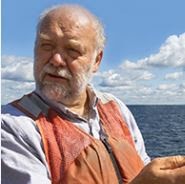
Dr. Lars Rudstam, Cornell University: Using size spectrum modeling to understand spatial and temporal variability in food web structure in the Laurentian Great Lakes.
With co-mentor Dr. Doran Mason of NOAA GLERL, Dr. Rudstam and postdoctoral fellow Dr. Zachary Feiner will use a size-based ecological modeling approach to relate changes in the food web to primary productivity and anthropogenic disturbance across a range of Great Lakes ecosystems.

Dr. Aaron Fisk, University of Windsor: Understanding the influence of environmental variation and anthropogenic stressors on fish movements and migration in Lake Erie through novel technology.
Dr. Fisk will team up with co-mentor Tom Johengen of CIGLR and postdoctoral fellow Dr. Jordan Matley to assess the impact of environmental variability and proposed wind turbines on walleye behavior in Lake Erie using acoustic telemetry.

Dr. Greg Dick, University of Michigan: Development of a gene-based model of toxin production by Microcystis aeruginosa in Lake Erie.
Postdoctoral fellow Dr. Kevin Meyer will work with Dr. Dick and NOAA GLERL co-mentor Dr. Craig Stow to develop a model that uses environmental genetic data to explicitly predict toxin production by cyanobacterial harmful algal blooms. a
Graduate Research Fellowship Awards
Two graduate students will receive support to work on the following projects:
- Dr. Lars Rudstam, Cornell University: Using size spectrum modeling to understand spatial and temporal variability in food web structure in the Laurentian Great Lakes.
- Dr. Aaron Fisk, University of Windsor: Understanding the influence of environmental variation and anthropogenic stressors on fish movements and migration in Lake Erie through novel technology.
Summit and Working Group (SWG) Awards
CIGLR will host two exciting SWGs in 2018, led by the following:

Dr. Michael Murray, National Wildlife Federation: Revisiting the Prescription: Assessing Recent Progress, Understanding of Stresses and Responses, and Needs Concerning Restoring and Protecting the Great Lakes With steering committee members David Allan (University of Michigan), John Bratton (LimnoTech), Jan Ciborowski (University of Windsor), Lucinda Johnson (University Minnesota-Duluth), Alan Steinman (Grand Valley State University), and Craig Stow (NOAA GLERL), this summit will review the current state of knowledge regarding ecosystem responses to major anthropogenic stresses, and what research and tools are needed to advance Great Lakes protection and restoration efforts.

Brad Garmon, Michigan Environmental Council: Improving Nutrient-Loading/Algal-Growth Modeling through a Watershed-Scale Approach that Emphasizes Soil Health & Upland Farming Practices This summit will convene leading academic researchers, federal scientists, agricultural stakeholders, and environmental/conservation advocates to focus on improving predictive models for harmful algae blooms (HABs) in Lakes Erie and Huron (Saginaw Bay), through watershed-level approaches that incorporate a range of soil-health measures and adoption of soil-health best management practices (BMPs).

